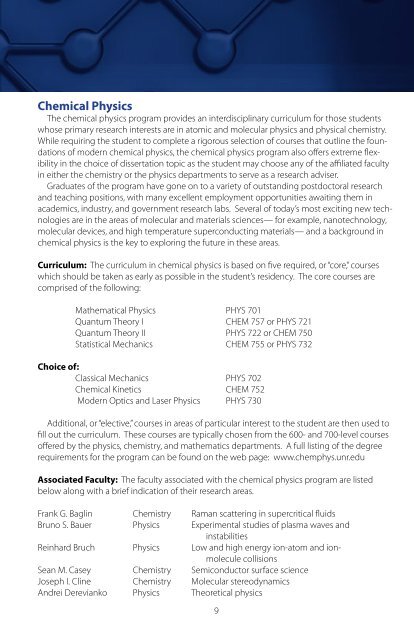Chemistry and Chemical Physics Graduate Programs brochure
Chemistry and Chemical Physics Graduate Programs brochure
Chemistry and Chemical Physics Graduate Programs brochure
You also want an ePaper? Increase the reach of your titles
YUMPU automatically turns print PDFs into web optimized ePapers that Google loves.
<strong>Chemical</strong> <strong>Physics</strong><br />
The chemical physics program provides an interdisciplinary curriculum for those students<br />
whose primary research interests are in atomic <strong>and</strong> molecular physics <strong>and</strong> physical chemistry.<br />
While requiring the student to complete a rigorous selection of courses that outline the foundations<br />
of modern chemical physics, the chemical physics program also offers extreme flexibility<br />
in the choice of dissertation topic as the student may choose any of the affiliated faculty<br />
in either the chemistry or the physics departments to serve as a research adviser.<br />
<strong>Graduate</strong>s of the program have gone on to a variety of outst<strong>and</strong>ing postdoctoral research<br />
<strong>and</strong> teaching positions, with many excellent employment opportunities awaiting them in<br />
academics, industry, <strong>and</strong> government research labs. Several of today’s most exciting new technologies<br />
are in the areas of molecular <strong>and</strong> materials sciences— for example, nanotechnology,<br />
molecular devices, <strong>and</strong> high temperature superconducting materials— <strong>and</strong> a background in<br />
chemical physics is the key to exploring the future in these areas.<br />
Curriculum: The curriculum in chemical physics is based on five required, or “core,” courses<br />
which should be taken as early as possible in the student’s residency. The core courses are<br />
comprised of the following:<br />
Mathematical <strong>Physics</strong> PHYS 701<br />
Quantum Theory I CHEM 757 or PHYS 721<br />
Quantum Theory II PHYS 722 or CHEM 750<br />
Statistical Mechanics CHEM 755 or PHYS 732<br />
Choice of:<br />
Classical Mechanics PHYS 702<br />
<strong>Chemical</strong> Kinetics CHEM 752<br />
Modern Optics <strong>and</strong> Laser <strong>Physics</strong> PHYS 730<br />
Additional, or “elective,” courses in areas of particular interest to the student are then used to<br />
fill out the curriculum. These courses are typically chosen from the 600- <strong>and</strong> 700-level courses<br />
offered by the physics, chemistry, <strong>and</strong> mathematics departments. A full listing of the degree<br />
requirements for the program can be found on the web page: www.chemphys.unr.edu<br />
Associated Faculty: The faculty associated with the chemical physics program are listed<br />
below along with a brief indication of their research areas.<br />
Frank G. Baglin <strong>Chemistry</strong> Raman scattering in supercritical fluids<br />
Bruno S. Bauer <strong>Physics</strong> Experimental studies of plasma waves <strong>and</strong><br />
instabilities<br />
Reinhard Bruch <strong>Physics</strong> Low <strong>and</strong> high energy ion-atom <strong>and</strong> ion-<br />
molecule collisions<br />
Sean M. Casey <strong>Chemistry</strong> Semiconductor surface science<br />
Joseph I. Cline <strong>Chemistry</strong> Molecular stereodynamics<br />
Andrei Derevianko <strong>Physics</strong> Theoretical physics<br />
9


